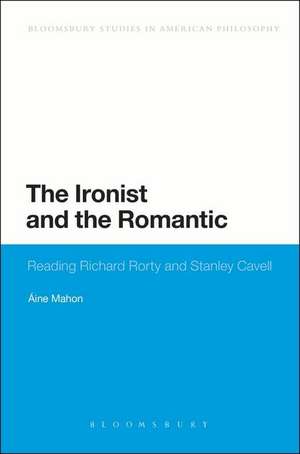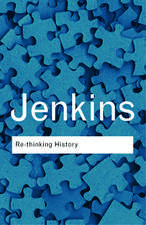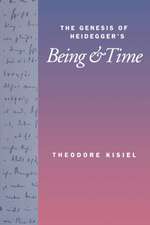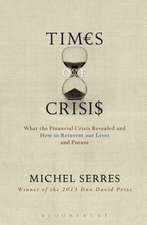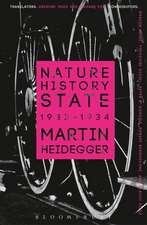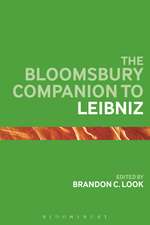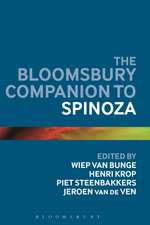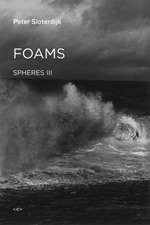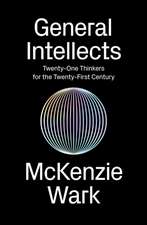The Ironist and the Romantic: Reading Richard Rorty and Stanley Cavell: Bloomsbury Studies in American Philosophy
Autor Dr Áine Mahonen Limba Engleză Hardback – 21 mai 2014
| Toate formatele și edițiile | Preț | Express |
|---|---|---|
| Paperback (1) | 256.12 lei 6-8 săpt. | |
| Bloomsbury Publishing – 18 noi 2015 | 256.12 lei 6-8 săpt. | |
| Hardback (1) | 772.74 lei 6-8 săpt. | |
| Bloomsbury Publishing – 21 mai 2014 | 772.74 lei 6-8 săpt. |
Preț: 772.74 lei
Preț vechi: 898.53 lei
-14% Nou
Puncte Express: 1159
Preț estimativ în valută:
147.86€ • 154.80$ • 122.35£
147.86€ • 154.80$ • 122.35£
Carte tipărită la comandă
Livrare economică 07-21 aprilie
Preluare comenzi: 021 569.72.76
Specificații
ISBN-13: 9781441146014
ISBN-10: 1441146016
Pagini: 208
Dimensiuni: 156 x 234 x 13 mm
Greutate: 0.46 kg
Editura: Bloomsbury Publishing
Colecția Bloomsbury Academic
Seria Bloomsbury Studies in American Philosophy
Locul publicării:London, United Kingdom
ISBN-10: 1441146016
Pagini: 208
Dimensiuni: 156 x 234 x 13 mm
Greutate: 0.46 kg
Editura: Bloomsbury Publishing
Colecția Bloomsbury Academic
Seria Bloomsbury Studies in American Philosophy
Locul publicării:London, United Kingdom
Caracteristici
Presents a timely profile and interrogation of the philosophical achievements of these two important figures
Notă biografică
Áine Mahon is a Fulbright Visiting Scholar in the Department of Philosophy at The New School for Social Research, New York, USA.
Cuprins
List of AbbreviationsIntroduction1. Return of the Invisible Tomato2. What's the Use of Calling Cavell a Pragmatist?3. The Turn to Literature4. Stylists of the Philosophical5. The Personal and the PoliticalConclusionNotesBibliographyIndex
Recenzii
In different ways, Stanley Cavell and Richard Rorty each argued that in philosophy at its highest levels of accomplishment voice and sensibility are inseparable from content and argument. Áine Mahon's comparative study situates and assesses their claims in relation to wider issues about knowledge, literature, politics, and public life, pitting Cavell's pursuit of intense exemplarity against Rorty's commitment to ironically qualified solidarity. Her work will be indispensable to anyone concerned to think about American philosophy's pasts, publics, and prospects.
Ranging from Emerson to Wittgenstein, and from pragmatism to postmodernism, with many other topics and themes in between, The Ironist and the Romantic reveals just how rich and varied the American philosophical conversation has been, and, perhaps even more importantly, just how necessary it is to keep the conversation going.
Charting separate tracks through the perilous thickets of philosophizing after Wittgenstein, both Richard Rorty and Stanley Cavell have refused the hollow clichés and boastful promises by which far too much of contemporary philosophy lets itself off the hook. How can we fully confront the unmooring of foundations, the persistence of disagreement, and other fraying problems of our cultural present? In launching a comparative study of Cavell and Rorty, Áine Mahon has her finger on the pulse of the humanities today in all of their strange rhythms. With clear prose and catchy phrase, Mahon develops productive engagements with Rorty, Cavell, literature, film, and the philosophy of philosophy. In so doing, she motivates our engagement with two of the best options available to us in the philosophical present, and she shows how these options both refract and resist one another.
Ranging from Emerson to Wittgenstein, and from pragmatism to postmodernism, with many other topics and themes in between, The Ironist and the Romantic reveals just how rich and varied the American philosophical conversation has been, and, perhaps even more importantly, just how necessary it is to keep the conversation going.
Charting separate tracks through the perilous thickets of philosophizing after Wittgenstein, both Richard Rorty and Stanley Cavell have refused the hollow clichés and boastful promises by which far too much of contemporary philosophy lets itself off the hook. How can we fully confront the unmooring of foundations, the persistence of disagreement, and other fraying problems of our cultural present? In launching a comparative study of Cavell and Rorty, Áine Mahon has her finger on the pulse of the humanities today in all of their strange rhythms. With clear prose and catchy phrase, Mahon develops productive engagements with Rorty, Cavell, literature, film, and the philosophy of philosophy. In so doing, she motivates our engagement with two of the best options available to us in the philosophical present, and she shows how these options both refract and resist one another.
